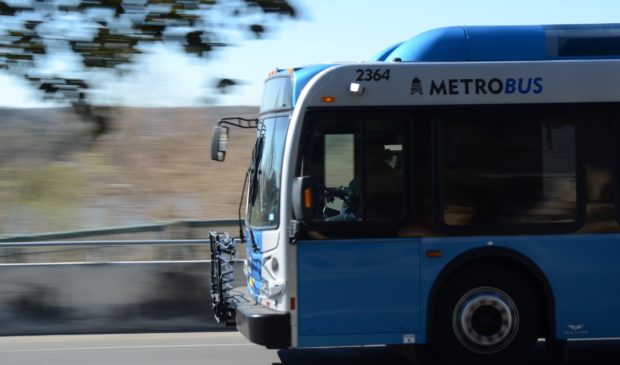Travis County looks to get into the transit game
Friday, June 23, 2017 by
Caleb Pritchard The Capital Metropolitan Transportation Authority could soon expand its transit operations into unincorporated parts of the county thanks to a vote at the Travis County Commissioners Court on Tuesday.
The court’s unanimous decision to begin crafting a transit development plan is the latest in a flurry of interlocal agreements between Capital Metro and other jurisdictions that are designed to expand transit opportunities outside of the agency’s service area.
Since 2014, non-member communities such as Round Rock, Georgetown, Buda, Hutto and Pflugerville have worked with Capital Metro on their own transit development plans. Thanks to Central Texas’ titanic growth, the U.S. Census Bureau deemed those towns to be part of the urbanized area of the region, thus disqualifying them from participating with the Capital Area Regional Transportation System, known as CARTS.
And because each had reached its cap on sales tax, they are unable to join Capital Metro as full-fledged members. Instead, through the transit development plans, the agency uses federal grants along with local contributions to cater transit service to each community’s needs.
The plan Travis County is working toward would not lead to Capital Metro service extending to all corners of the county. Instead, the agency would only cater to unincorporated areas deemed urbanized by the Census Bureau, a relatively small collection of territories that include Hornsby Bend and parts of Del Valle, among others.
The county will spend $16,000 of its own money to develop the plan, or 20 percent of the total cost. Capital Metro will apply Federal Transit Administration funds to cover the remainder. If the court approves the proposed plan – which is likely to come back for consideration next year – the county would be responsible for 60 percent of the cost of transit service, while the agency fills in the rest with more federal money.
Commissioner Gerald Daugherty expressed his discomfort at that funding formula, especially as it pertained to cities that had once been in Capital Metro’s service area but voted themselves out.
“You either pay the penny sales tax and you’re in the district, or you’re not,” said Daugherty. “Now, we do need to go to probably Sen. (Kirk) Watson or whatever, and we need to do some work to change the composition of how Capital Metro was set up to perhaps find a way to allow people to be in it, but they need to pay.”
Scheleen Walker, the county’s long range planning manager, called the proposal a “win-win.” Working on the transit development plan will give the county access to Capital Metro’s professional transit planners, who can help weigh in on the ongoing comprehensive multimodal transportation plan that Walker and her colleagues are currently putting together, she explained.
“It is not going to be as extensive as anything that’s going on in the city of Austin. There’s not the density out there,” said Walker. “But there are different sorts of services that Cap Metro provides that fill in the last mile and that can maybe get people to other routes that then get them into the city.”
Capital Metro’s regional coordination planner Michelle Meaux reiterated that assertion to the Austin Monitor during a conversation on Thursday afternoon. “What we are doing is using information from these (transit development plans) to incorporate into Project Connect for local connections to whatever high capacity transit is planned in Project Connect,” she said.
It is also likely that the agency’s conventional fixed-route bus service won’t necessarily be a cornerstone of the Travis County transit plan. In each community, Capital Metro planners cater service for the unique needs and environment. In Travis County’s case, Meaux suggested that the plan could bridge the gap between urbanized and rural areas.
“It’s going to be a little more complicated” than other plans, she said. “CARTS is, we’re hoping, going to take an even bigger role in this because I think some of the services we recommend out of this may go into the CARTS rural area.”
The Capital Metro Board of Directors will still have to sign off on the interlocal agreement with the county to begin developing the transit plan. Meaux said she expects that vote to come up during the board’s July 31 meeting.
This story has been altered since publication to correct a typo. Photo by John Flynn.
The Austin Monitor’s work is made possible by donations from the community. Though our reporting covers donors from time to time, we are careful to keep business and editorial efforts separate while maintaining transparency. A complete list of donors is available here, and our code of ethics is explained here.
You're a community leader
And we’re honored you look to us for serious, in-depth news. You know a strong community needs local and dedicated watchdog reporting. We’re here for you and that won’t change. Now will you take the powerful next step and support our nonprofit news organization?









